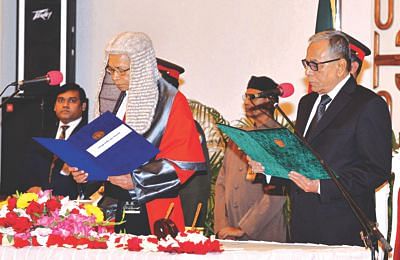Expectation from the new Chief Justice
Expectation from the new Chief Justice

WELCOME Mr. Justice SK Sinha, the 21st Chief Justice of Bangladesh. Amid much political disillusionment, appointment of the new Chief Justice is epic making at least for two reasons: firstly, a member from minority community for the first time has achieved this honor; secondly, because of his extensive professional and administrative experience and integrity it is widely agreed that, 'right person is in the right position'. His appointment has rejuvenated diminishing public faith on judiciary; has regenerated public expectations to judiciary. The present articulation is a glimpse of public expectations to the Chief Justice.
Sanctity of Oath: As per oath, it is imperative for the Chief Justice to faithfully discharge lawful duties; to bear true faith and allegiance to Bangladesh; to preserve, protect and defend the Constitution and laws; and to do right to the people dispassionately. The Supreme Court is the abode of rights, and illuminating leadership of a Chief Justice may manifest enduring aspiration for equality, human dignity and social justice.
Public Confidence: The rule of law exists in society not for the reason that law is administered by the judiciary and enforced by the executive, but for the reason that it is voluntary accepted and followed by the common people. Therefore, the judiciary (and executive as well) must earn and maintain public confidence for operation of rule of law in society. There is no discontent that public confidence gives legitimacy to the judiciary. For reasons known well, public confidence on judiciary is gradually eroding. The prime concern for the Chief Justice is to regain public confidence. The judiciary must come-out of the conservationist approach. It must come in regular interaction with Bar, civil society and media even.
Access to Justice: Stakeholders are agreed that apart from resource constraint delay, cost, complexity and corruption are the main barriers to the access to justice in Bangladesh. Even though it is easy to deny the report of the Transparency International Bangladesh and other public perceptions regarding judiciary, neither truth is distorted, nor do things get right by such denial. The public perception is the result of true experience and facts. The Chief Justice as the guardian of the judiciary must take courageous initiative to set things right and to eliminate negative perception.
Public Liaison Office: Even though our court rooms are open for public (except camera trial) other than lawyers and litigants rarely any people visit court premise. Now, electronic and print media provide information about the judiciary to the mass people. As there is no public relation office, the media or party lawyer in many instances provide distorted information to the public. To create public awareness regarding judicial functions, establishment of a public liaison office in the Supreme Court and all district courts is imperative.
Public Grievance Desk: Apart from the verdict, many issues are associated with the administration of justice which may cause public grievance. A person harassed in case management or court administration has no forum to seek remedy. To ensure transparency and accountability in administration of justice it is obvious that there should be a Public Grievance Desk in every tier of the judiciary. Such Desk will promote public confidence upon judiciary.
Appointment Rules: The present criterion for appointment of judges of the Supreme Court is based on experience only. Being appointed, the Chief Justice has vowed to maintain the seniority principle in appointing judges in the Supreme Court. However, in many jurisdictions vacant posts of the Supreme Court are advertised, and the selection criteria include predominantly merit, then seniority and experience. It is widely expected that the present selection criterion should be amended to encompass all established principles so as to make the appointment process more transparent and acceptable.
Court Administration and Case Management: To eliminate bribery, the affidavit and filing sections should be controlled directly by the Registrar or of his assistants. All section offices should be under 'Close Circuit Camera Surveillance'. Cause list should be strictly followed. There is a growing tendency that judges declare order in open court but take unusually lengthy time to sign the order. Especially in criminal trial it is desirable that the time gap between 'pronouncing' and 'signing' of order should be definite.
Decentralising HC's Sessions: Legal institutions must be accessible if rights are to be enforced. There must be a system of courts available locally to challenge the mal-administration, and for enforcement of fundamental rights. Hence, under the mandate of article 100 of the Constitution the HC's Sessions should be decentralised.
As all know, there is no end of perfection and so of the reform. It is expected that to manifest the towering pledges as enshrined in oath, and to secure public aspiration for justice, the Chief Justice should never cease to intervene if, and when necessary.
The writer is Lecturer in Law at Jahangirnagar University.